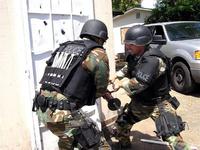-
D.C. continues to struggle with orderly evacuations

Last week’s earthquake that struck less than ninety miles outside of Washington, D.C. exposed the city’s continuing difficulties in effectively evacuating its residents; after the 5.9 magnitude earthquake struck the region, commuters were left stranded for hours as road traffic ground to a halt and trains became overcrowded and delayed due to speed restrictions because of the quake
-
-
DHS announces 2011 grants, $800 million less than 2010
Last week DHS announced that it would begin distributing more than $2.1 billion in grant money to state and local agencies for fiscal year 2011, nearly $800 million less than last year; the reduction in grant money comes as a reflection of the U.S. government’s attempts to cut spending and find cost savings
-
-
Texas bills government $349 million for illegal immigrants
Earlier this month in a letter to DHS secretary Janet Napolitano, Texas governor Rick Perry blamed the federal government for failing to secure the border and requested $349 million to help cover the costs of detaining illegal immigrants; when she was governor of Arizona, Napolitano would also regularly send the Department of Justice invoices seeking reimbursements for illegal immigration-related expenses by the state of Arizona
-
-
San Jose halts gang violence, ends ICE partnership

Two months after it began its alliance with immigration officials to crack down on gang violence, the San Jose Police Department in California announced that it was ending its partnership with the U.S. Immigration and Customs Enforcement (ICE) agency; on 24 June, two ICE agents stepped in to help San Jose which was struggling to contain its highest murder rate in twenty years
-
-
North Dakota receives $10 million for border security
To help secure the U.S.— Canada border, North Dakota will receive more than $9.6 million in DHS grants; the funds are aimed at helping local law enforcement agencies prevent a terrorist attack, secure the border, and bolster emergency preparedness
-
-
Obama administration seeks hold on tough Alabama immigration law
The Obama administration has requested a federal judge to temporarily block a tough new immigration law set to take effect in Alabama on 1 September
-
-
Detroit police to stop responding to unverified burglar alarms
As of Monday, 22 August, the Detroit police department will no longer respond to burglar alarms unless security companies can verify the need for an officer; the policy is aimed at reducing the number of false alarms and allowing officers more time to focus on critical duties; more than 98 percent of all burglar alarms are false alarms; critics of the new policy fear that it will exacerbate safety conditions in a city already plagued by crime and slow police response times
-
-
"Cop shops" in Texas help fight apartment crime
Residents in Texas apartment complexes have begun dedicating entire units to police officers so they have a place to rest, take a break, and fill out reports; the cop shops help minimize crime by keeping officers in parts of town where their presence is needed
-
-
Sector Report for Friday, 19 August 2011: State / Local
This report contains the following stories.
Plus 5 additional stories
-
-
Purdue helps Chicago prepare for disasters
To be better prepared for a major natural disaster or a terrorist attack, seventeen counties near Chicago, Illinois have banded together to create a disaster preparedness plan with the help of Purdue University and the University of Illinois, Chicago
-
-
Phoenix police banned from sporting tattoos

In an effort to present a more professional image, an increasing number of police departments across the United States are requiring officers to cover up their tattoos; the Phoenix police department recently began requiring its officers to cover its tattoos, a move that has generated criticism due to the intense Arizona heat
-
-
Arkansas farmers and ranchers crippled by natural disasters
This year’s series of natural disasters have crippled Arkansas’ farming and ranching sectors; the barrage of natural disasters including floods, droughts, and fires have resulted in more than half a billion dollars in losses for farmers in Arkansas
-
-
Mississippi schools consider fingerprint scanners
A school district in Mississippi is considering installing biometric fingerprint scanners at its cafeterias to identify students; Tupelo School District officials are currently debating a proposal to use biometrics instead of the existing system which relies on student ID numbers for meals; one official argues that the new system would make lines flow more quickly and ultimately contribute to increased student performance
-
-
New task force helps protect Port of Virginia
A new border security task force has been launched to help secure the Port of Virginia; the task force is comprised of ten officers and agents from a total of ten local, state, and federal agencies that will be responsible for securing the Port of Virginia against a variety of criminal acts including trade fraud, cargo theft, and the illegal smuggling of drugs, persons, currency, and weapons
-
-
Dallas launches regional nuke detectors
The Dallas police will soon be participating in a regional radiological nuclear detection program that will help law enforcement officials detect any anomalies and help protect against any nuclear or radiological attacks
-
More headlines
The long view
Smaller Nuclear Reactors Spark Renewed Interest in a Once-Shunned Energy Source
In the past two years, half the states have taken action to promote nuclear power, from creating nuclear task forces to integrating nuclear into long-term energy plans.
